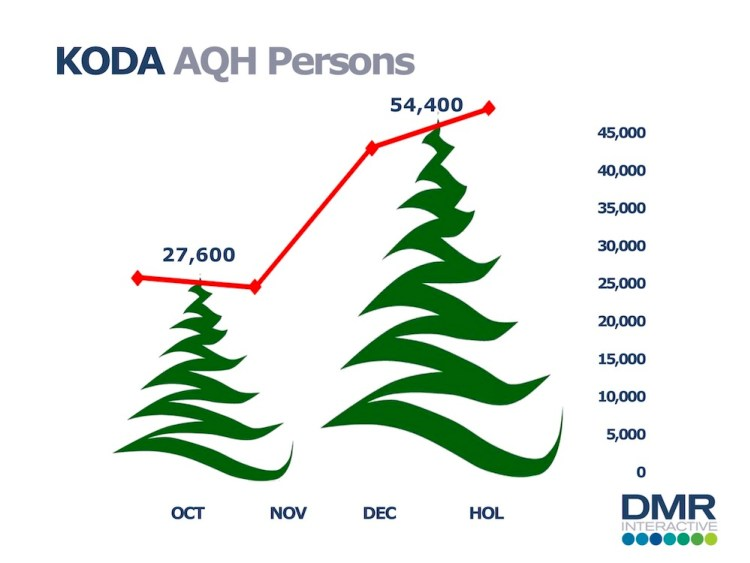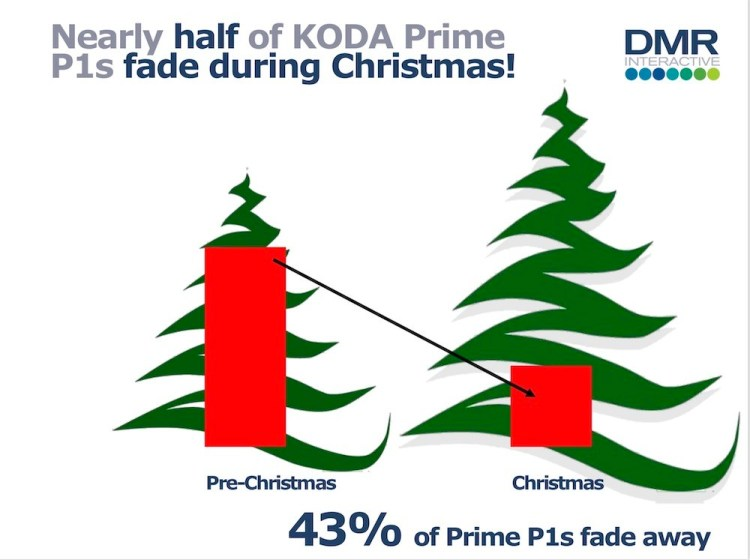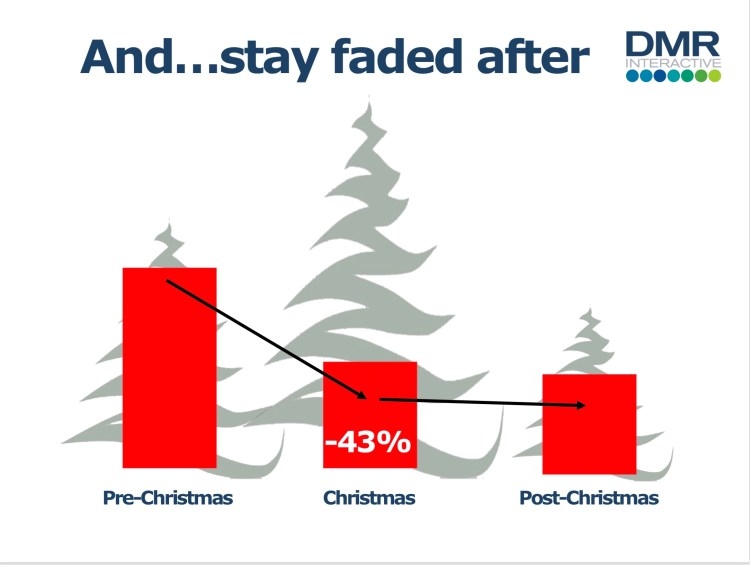Advertisement
|
All Christmas Music? Or Not?
| RADIO ONLINE | Wednesday, November 6, 2019 | 7:43am CT |





|
 |
Every year, more and more stations flip to all Christmas music. In many markets, multiple stations battle it out to win the season. On the surface, it seems like a great idea.
Radio stations that switch to all Christmas music usually win, at least in the short term. Further, those that have done it for a number of years usually see the greatest lift. They become known as the Christmas station in their market, building equity that has a positive halo effect.
It works! It really does. One or two things happen, generally speaking: 1) The station cumulative audience (Cume) goes through the roof, and/or: 2) But regular P1 Time Spent Listening (those who really love your format) declines.
Should your station go all Christmas? Maybe. Maybe not. As in most things, there are many factors to take into consideration.
The Decision: All Christmas Music Or Not?
The all-holiday music format remains one of radio's most enduring and profitable gimmicks, according to New York Times reporter Ben Sisario. The number of stations embracing the format has nearly doubled, and competition between broadcasters often leads to stations turning earlier and earlier. It's true. To get a head start on competitors, stations are trending to making the flip shortly after Halloween. But is Christmas music a gimmick? Really? Or is it a smart programming strategy?
Why does it work? Gary Fisher, owner Equity Communications' WEZW-FM/Atlantic City says: Christmas music is a link to better times. And in a world that is filled with more stress and negativity, that is a powerful emotion. This presents a unique and powerful marketing opportunity that's potentially more valuable in establishing brand values than any external marketing campaign could.
All Christmas Music: Here Comes The Cume Thousands of new listeners come into the Christmas music station, many of whom are unfamiliar with the primary benefits normally offered. Many of these new listeners become P1 to the Christmas station, at least until everything returns to normal.
DMR Interactive studied audience trends of stations that convert to all Christmas. The AQH (Average Quarter Hour) increase for KODA/Houston is driven primarily by new listeners finding the station.

This can spike ratings in the short-term and provides an inexpensive marketing opportunity to promote a station's brand values. The dramatic increase in quarter hours from new listeners finding the station sets up an opportunity to promote a station's brand in the hopes it will stay with the station after Christmas. But does this work? Maybe. Sometimes.
It Even Drives P1 Listening
Of course, cume growth alone is not enough fuel to power the tremendous ratings gains on Christmas stations. There's also a large TSL increase, and most of it comes from new P1 listeners. Notice how many quarter hours from P1 listeners KODA gains:

That would seem to be good news, right? But hold on. There's more data that shows where those P1's come from.
Why You Maybe Should NOT Go All Christmas Music
The argument against it, of course, is that going all Christmas takes you out of format. Consistently delivering to listener expectations each day is important. There's a real fear that stations will virtually invite the existing audience to go elsewhere! And they might. In other words, there's risk. The decision, then, rests on whether a) the increase outweighs the loss, and b) if your fanbase is strong enough that they'll return when the specialty programming is over. Further, there's little evidence that the infusion of new listeners are retained after December 25. Once life gets back to "normal" and listeners settle back into their routines, they typically return to their favorite station. And, since you've been playing Christmas music, you haven't been able to leverage the attention by demonstrating your regular format.
The DMR study shows that most of the growth in P1 quarter hours comes from new listeners. The Christmas station often loses their own (pre-Christmas) P1 quarter-hours.

A large percentage of Prime P1's (the station's most valuable listeners leave the station. Take this into consideration and weigh the benefit of attracting a new cume against the loss in P1s.
Post Christmas Impact
Listeners are creatures of habit. Their favorite stations tend to stay their favorite stations. So even if they become attracted to the Christmas station in December, there's little supporting evidence that the growth lasts into January and February. In reality, most stations see their shares (and P1 listening) return to previous levels.
But even more concerning, a percentage of heavy listeners who leave the Christmas station don't come back right away.
This chart shows how a station's P1 listening is slow to return after the station returns to regular programming. Perhaps their audience finds another source they like just as much or better. Or maybe they just forget to return.

Regardless of the reason, there's evidence that some P1 erosion takes place after Christmas.
Overall, the audience exchange seems to be relatively equal. Even if P1's don't return, stations hang onto enough new cume to maintain pre-holiday levels.

All Christmas Music Is a Marketing Tool
While some listeners may be upset with a flip to all Christmas, the marketing aspect is valuable. Viewed as a marketing strategy, playing all Christmas music is a way to reflect the mood of your market. In that way, risk is mitigated.
Consultant Mike McVay has been in charge of stations that have gone all-Christmas for over 20 years. He explains why it works:
If you looked at raw numbers - let's say you started with 100 people and you lost 20 of them because they don't like Christmas music (exclusively). You'll get 30 people coming back in because they do. There is audience turnover but the net is a larger audience. Some people put it on all day and leave it on at work. That's not unusual. But what also plays into it are the little promotion and production pieces that people are fond of - soldiers saying hello to their families, little children talking about their favorite Christmas toy or (gift) wish. So there's a lot of goodwill beyond the music that makes (the format) very big.
Christmas music makes a positive statement about a station's brand values, particularly if those values reflect traditional and family, such as in the AC or Christian formats.
Using Christmas As A Format Change
Many stations use Christmas to make a format change. If that's the case, there's nothing to lose. Switch early. How early? How about right after Halloween? Get there fast and gain a presence for it. Some of the programming may be "wasted" by being on before the market is in the mood, but at least the position is claimed. The format is being flushed anyway, so there's little real risk.
Another good reasons to consider all Christmas music as a marketing or positioning strategy. For many years, a popular tactic was to use Christmas music as a palate cleanser to introduce a format change or significant brand adjustment. The theory is that it attracts a large new audience and is a platform to promote the new station. Just be sure to have a solid strategy for converting listeners to the new format. They forget a lot in that week between Christmas and New Year's Day.
When To Flip to Christmas
Every year, stations debate the best date and time to make the switch.
My advice: Identify the perfect date. Then launch a week earlier. Even if this violates what seems to make sense, stake the claim to win the position as far in advance as needed. You can't afford to be second or third station in, especially if another station is known for it. The first one in will get more attention and publicity. And all those complainers that "it's too early"? Those complaints are okay. At least they know you for it!
The traditional time to switch is over Thanksgiving weekend (in the US). That's usually around the last weekend of the month of November. I'd make the case to do it on the Tuesday or Wednesday before Thanksgiving to take advantage of the tune-in before folks get on the road for the long weekend.
But when to flip is also influenced by local factors:
- If another station in the market is known as "the" Christmas station, it's better to flip as early as possible, and certainly before the competition turns on the holiday tunes.
- If known as the station for Christmas, it's possible to wait a little longer. But then, why would you want to? Don't let a competitor gain an advantage by being out of format when the audience is in the mood for it.
If not in it by December 1, it's probably too late.
The bottom line: It's better to be a little too early than a little too late.
Special Programming
Perhaps most importantly, realize that winning Christmas may compromise carefully crafted programming clocks. That's okay. Christmas is a time for traditional connections. Use that advantage and reflect listener feelings. That may mean playing music that is older and dated, or the production can't be as "in your face" as you might like. Adjust and be in-the-moment with your audience.
Promote, Promote, Promote
A station that does a great job with Christmas can extend appeal beyond the existing cume. But only if the market knows about it. During Christmas programming, include clear listener benefits of what the station offers and who it's for. This applies to stations going all Christmas and those who stay in format.
But do it in the spirit and context of the programming surrounding those promos. In other words, imaging and messaging should match the Christmas theme. Watch the Hallmark TV channel at the holidays. Everything they do is themed around Christmas, while promoting the type of programming they offer year 'round.
One of the most promotable attributes will be personalities, especially high profile morning talent. Make sure they are on-board and excited about the music. They need to sound as if they love it as much as the audience. This will go a long way to increasing their likability and introduce them to the new cume. It also helps retain a fan base who misses the "regular format." And, be sure the talent sprinkles in plenty of Christmas topics and listener interaction. In many cases, the stronger the personalities, the better the chances Christmas programming will work.
Plan Two Major Promotions
A Christmas themed promotion should run during Christmas programming with the goal of building the station database with new listeners. These new contacts can be valuable for post-Christmas marketing campaigns.
The real challenge starts on December 26. The week after Christmas and the first weeks of January are critical. And it's prime time to be promotionally active.
DMR President Andrew Curran says, "Rebuilding audience becomes job No. 1 as soon as the last Christmas carol is finished playing."
This is an opportune time to introduce new features, programming upgrades and format changes. It's also a good strategy to promote into a major contest or promotional campaign. Yes, I know it's often between ratings periods. But the goal is to establish new listening patterns on the back of specialty programming. And promotions can be a major part of that. Stations making the switch should have a strategy in place to harvest the short term audience crop!
Conclusion
Typically, stations that flip to all-Christmas see more benefits than not. And some are able to turn that into momentum for the new year. But even if there is no long-term gain, it still could make sense to switch. Think of it as a short-term promotion. When you run a big money contest, listening levels go back to normal shortly after it ends. But you still do it. Why? Because it attracts attention, at least for the short-term. And Christmas music generates even more attention.
At some point, listeners probably reach the point of saturation and there'll be too many Christmas stations. But there is no evidence of that yet. Until that happens, take advantage of it. And if you're the station that has been doing it and is known for it, keep doing it. Don't give up the franchise.
Christmas music absolutely, positively reflects the market's mood. It will attract new listeners. Just make sure there's a plan in place to retain as many listeners as possible and bring back the P1's who may have left during December.
This article is a special Radio Online contribution from Tracy Johnson, CEO, President of Tracy Johnson Media Group
Advertisement
|
Latest Radio Stories
Sports Radio Audience Delivers Upscale Impact
|
Civic Media Revamps News/Talk Format in Wisconsin
|
JVC Ups Mallory, Adds Miller in Fort Walton Beach
|
Advertisement
|
BFOA Announces 2026 Honorees of the Leadership Awards
|
Santita Jackson to Continue ''Keep Hope Alive''
|
Dave Wheeler Returns to Roser in Utica Changes
|

















